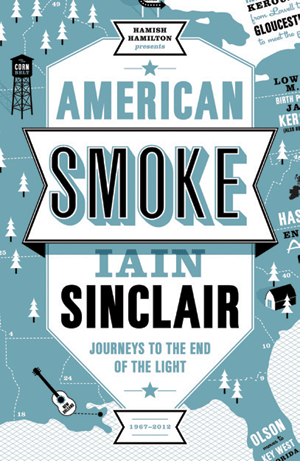
This article is a preview from the Winter 2013 issue of New Humanist magazine. You can subscribe here.
Iain Sinclair has been hovering for some time now on the threshold of the winners-enclosure-cum-padded-cell of English letters marked “National Treasure”. For over forty years, Sinclair has combined obsessive London-centred myth-making with urban despair; his achievement is to have created a prose style that can both spin esoteric theories about the placement of Hawksmoor’s east London churches and also curse the Docklands Development Corporation. He has aligned himself with the visionary line of English writing and wandering that looks back to Blake – and engaged in increasingly absurd travel exploits (walking round the M25; taking to the waterways in a swan-shaped pedalo) to continue seeing the landscape for himself.
Sinclair has also been a devotee of the strain of late English modernism headed up by JH Prynne and hard to encounter casually until selected and collected editions began to appear. For years, Sinclair was scathing about his near contemporaries in the literary establishment. In his 1991 novel Downriver, there’s an account of “Butts Green”, the successful quarterly literary magazine that has just killed the narrator’s piece about Tilbury docks: “There were sexier topics out there in the slums and shanties of magical realism. Travel was sexy. Poverty was sexy. The New Physics was sexy. Sex was not sexy. (Except for Martin Amis.)” It’s a fairly accurate takedown of one aspect of 1980s Granta and of Amis’s love of repetition. It also marks out Sinclair as a very different kind of travel writer; one who has drilled down into a very small area to extract as many associations as a small patch of London can support.
But, as Sinclair’s own writing has moved from poetry to prose, and as his books (once self-published, now put out by Penguin’s prestige literary imprint) have become longer and more lavishly produced, it’s been harder to see the writer behind the imitators, travelling companions and cosy cult trappings. His latest book, American Smoke, is more of a publisher’s conceit, a loose anthology, than it is the autonomous vision of its author, but for all that it may provide the clearest view of Sinclair that we’ve had in years.
In the first two pages Sinclair mock-heroically casts himself in two epic poems, the Divine Comedy and the Odyssey, to go in search of his personal idols, the demigods of a third tradition: “A good step beyond midway through my dark wood of the world, I came to America, hoping to reconnect with the heroes of my youth.” It’s 2011, the Olympics are a year away from landing in Sinclair’s home borough of Hackney and he wants to swaddle himself in a mythic comfort blanket, at least for a while: “I needed a new mythology to shield against the sense of loss and hanging dread inherent in the invasion and dissolution of my familiar London ground; forty years learning where to walk, and a few months to lose it all.” Sinclair’s Dantesque trip is to Gloucester, Massachusetts, home of the poet Charles Olson, the last rector of the influential liberal arts college Black Mountain: “a Valhalla of all the talents”.
The Olson section reworks an April 2013 piece in the London Review of Books about another Black Mountaineer, Edward Dorn. Between hard covers, Dorn budges up for another mentor, to provide a more solid reason for Sinclair’s presence in Gloucester, MA (he’s giving a lecture on Olson), and some of the earlier critical insights are finessed into personal travelogue. The book includes an account of Sinclair’s 1995 trip to New York to make a doomed documentary about the Beats, returns to London for a section about the Jewish East End novelist Alexander Baron and an acquaintance who worked on the filming of Volcano (1950) starring Anna Magnani (while Rossellini and Bergman were making Stromboli 12 miles away). Then off to the other coast, from Malcolm Lowry’s wartime Canadian shack to Gary Snyder’s ranch (and the poet himself) in northern California and then thoughts about Roberto Bolano in exile in Spain.
The journey to the centre of Sinclair’s youth takes us round the Beat and Black Mountain precincts of Donald Allen’s 1960 anthology The New American Poetry. He puts his finger on what he was running away from like this: “We didn’t buy English anger ... We didn’t buy class envy or class entitlement as a thesis. We didn’t buy the campus. We were denim-and-corduroy Puritans with Diggerish aspirations, overread, underused.” It’s a neat summing up of the choices made by the male divisions of postwar British writing, thrown by the fact of their coming of age when, as Malcolm Bradbury (campus branch) once put it, “Britain lost an empire and gained a washing machine.”
Looping through the book, as if to unify it after the fact, are references to Swandown, Andrew Kötting’s film in which he and Sinclair travel in a swan-shaped pedalo from Hastings to the Olympic Park, via Kent (though only Kötting makes the whole journey; Sinclair left filming to go to Gloucester). At one point in the film, Sinclair says, “I’m ready for America, I’m ready to get to other side of the Atlantic. The Olympics exist in a parallel universe ... it’s so digital, so virtual ... the karma is terrible.” Sinclair is too knowing a writer, or too knowing a writer now, to think that the analogue real is out there. He may liken the Swandown trip to a “Homeric Odyssey”, but he’s wry about his present-day hosts’ reaction to him “pedalling a plastic swan like a Saga-holiday veteran on a treadmill” – and candid about Snyder’s wariness of him: “the difficulty being that he doesn’t understand what I want, what I’m after, making this long trip.”
It’s a question Sinclair – always a self-referential writer, ready to undermine his ventures with his own ironic commentary – poses repeatedly. At the end of the Olson episode he writes, “The gossip of slack biography is impertinence. The man lives in language.” Sinclair has always been attached to the idea of the “bad journey” (prizing it as a cinephile prizes a film maudit) and is careful to cast his American adventures as doomed travel writing rather than as literary biography.
Sinclair’s best work, written in sentences loaded with verbs and low on conjunctions, can often be exhausting in long stretches; it’s most effective in an early work like Lud Heat (1975), even more so read aloud. Here the paratactic paranoid style matches the subject as Sinclair piles up his speculations about Hawksmoor’s symbolism and geometry: “His motives remain opaque; his churches are the mediums, filled with the dust of wooden voices.” He taps away in tricolons in Downriver introducing Milditch the bookdealer like this: “He made deals. He shuffled telephones. He haunted the dead zones of the city looking for connections that only he could activate.”
Charles Olson, in his 1950 statement on poetics, makes the case for “Projective Verse” instead of poetry as a closed form composed for print: “the kinetics of the thing. A poem is energy transferred from where the poet got it ... by way of the poem itself to, all the way over to, the reader.” Only a third of Lud Heat, Sinclair’s most perfect book, is about Hawksmoor; the rest is urban pastoral – a diary, interspersed with poems, of Sinclair working for Tower Hamlets Council, mowing lawns and tidying parks. Sinclair’s energy source seems to have been the gap between his idealism about London and the reality of the destructive market forces that shape it.
For now, Sinclair seems to be pausing for thought, winded by a demonic Olympic alliance of developers and government (“Dr Frankenstein with a Google Earth programme and a laser scalpel,” as he puts it in Ghost Milk). American Smoke is a self-consciously late work and Sinclair is full of late, reflective thoughts. He’s aware that the poets whose work have survived were “the ones who created a successful brand”. Considering Olson’s last days, he edges himself into the same frame: “And the last days of any of us? The work loses its potent illusion of edge and discovery, but it continues in Beckettian absurdity."
Iain Sinclair’s American Smoke: Journeys to the End of the Light is published by Hamish Hamilton

